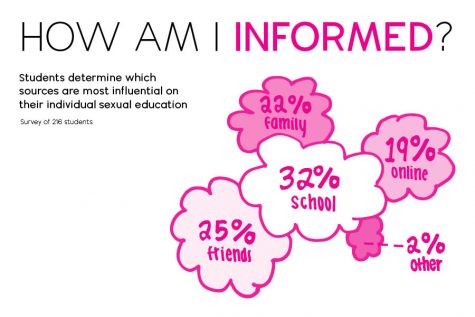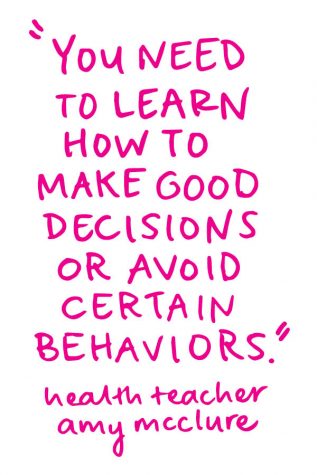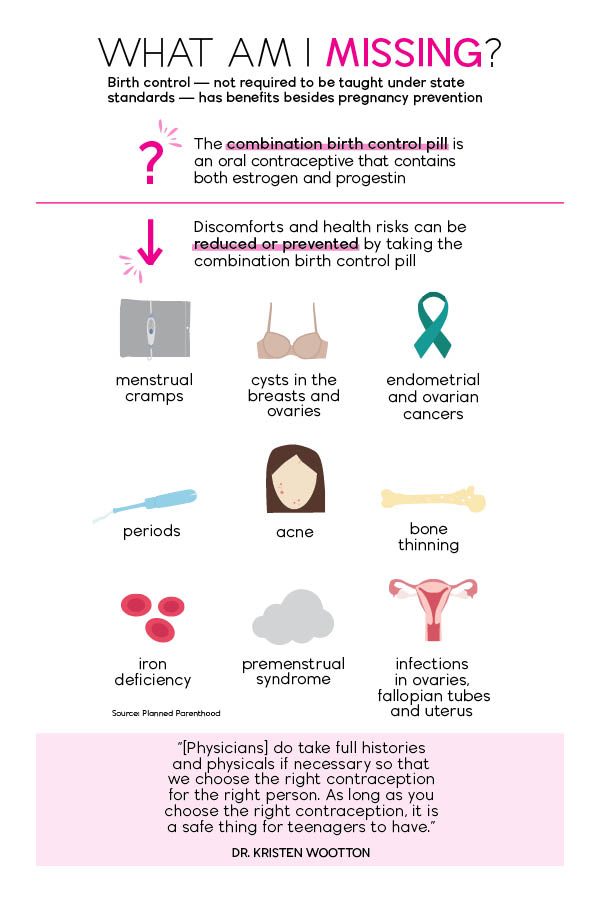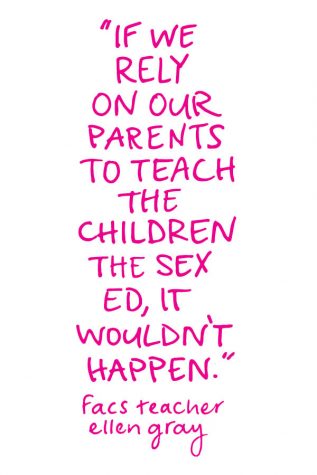School
District standards give teachers control over curriculum
September 20, 2018
The contrast in classes is due to the sexuality education standards set by the state, which leaves the curriculum to the discretion of the educator, so teachers decide what aspects of sexuality education are taught. While the district gives a baseline of abstinence-only sexuality education, it also allows teachers to add additional information regarding other forms of birth control if they wish to, much like the state standards do.
For context, abstinence-only sexuality education refers to a curriculum that solely promotes abstaining from sex, while abstinence-plus education promotes abstaining from sex, but also informs students over other options such as birth control and condoms. Comprehensive curriculum does not promote any form of pregnancy prevention, but informs students of all options.
 For example, abstinence-plus education is taught at the school by Health teacher Amy McClure, who includes contraceptives and birth control in her lesson plans due to her belief that such education is important for students to receive.
For example, abstinence-plus education is taught at the school by Health teacher Amy McClure, who includes contraceptives and birth control in her lesson plans due to her belief that such education is important for students to receive.
“The sophomore Health education that a student gets could potentially be the last class that a student gets in their educational career pertaining to their own personal health,” McClure said. “In a way, that frightens me, because you are 15 or 16 years old and these are skills that you’re going to use for a lifetime.”

On the other hand, Health teacher Sarah Haub believes that discussions regarding forms of birth control are inherently personal and need to be left to students and their families to discuss, so her lesson plans reflect an abstinence-only education.
“I feel like I might be overstepping the parents’ view in what they want their child to learn, so I try to make it to where [kids] can have conversations at home with their parents and can make decisions off of what their parents value and what they value and they can come up with what they believe together,” Haub said. “I believe that some of the stuff that we teach has to do with your family and your family culture.”
Additionally, Haub feels that regardless of what students’ values are, birth control is ultimately a personal choice that students need to make with their family, not the school.
“I feel like that’s a personal choice and a parental guiding choice. It’s not a discussion I should be leading with these kids. It doesn’t affect me; it affects your parents, siblings and other family members. It’s a family matter,” Haub said. “Although, if you’re not getting that information at home you can ask me about it and I’ll give it to you.”
As to the reasoning behind the design of the standards, Dr. Joe Kelly, Director of Curriculum and Instruction, attributes the vagueness of the district standards to being designed in a way that allows teachers to have control over what they teach, but lets students receive similar knowledge regardless of who is teaching them.
 “We want to have a base resource, but we treat [teachers] as professionals, so they can bring in other things to help them teach health class. We usually like them to discuss that and make sure that they get input from everyone,” Kelly said. “Our perspective is that there is a spectrum of risk, and we are committed to teaching students about the safest way to approach those types of situations … there is a spectrum of risk involved in human sexuality and the safest route is abstinence.”
“We want to have a base resource, but we treat [teachers] as professionals, so they can bring in other things to help them teach health class. We usually like them to discuss that and make sure that they get input from everyone,” Kelly said. “Our perspective is that there is a spectrum of risk, and we are committed to teaching students about the safest way to approach those types of situations … there is a spectrum of risk involved in human sexuality and the safest route is abstinence.”
While abstinence may be seen as the best option for educators to promote, Dr. Kristen Wootton, gynecologist and mother of two students at the school, believes a comprehensive sexuality education is best and should include everything ranging from different types of intercourse to options regarding contraceptives.
“Most of us assume that everybody knows the basics, but you’d be surprised how many people that show up on my doorstep that I’m showing anatomy to even though they’re 27 years old,” Wootton said. “I think you need to talk about all types of sex … [because] if you don’t, people have misconceptions about what is normal or not normal and what consequences can happen from any of those actions. Students need an open forum where they can ask any question that they want to ask and have it be answered in a safe and protected environment where they’re not made to feel like they shouldn’t ask.”

Similarly, junior Griffin Schenk would like to see a wider focus in regards to human sexuality than that currently offered by the curriculum.
“I think we should have more realistic expectations [with] the social environment, because that’s always changing,” Schenk said. “Abstinence isn’t always a realistic thing for everybody, so I think … it should still be presented as an option, but I think the more safe-sex approach is going to be much more effective.”
However, if students do want to receive more in-depth knowledge, supplemental elective classes such as Human Growth and Development and Family Studies also explore topics related to sexuality. The curriculum for these classes is allowed to be more thorough regarding safe sex and contraceptive options because students must choose to participate in these classes. Family and Consumer Sciences teacher Ellee Gray believes that such discussions are necessary because they may not occur at home.
“If we just rely on our parents to teach the children the sex ed, it wouldn’t happen. When I ask my students how many of their parents have talked to them, I probably have a handful of students out of 28 who will raise their hands,” Gray said. “So we have about three-fourths of our high school population whose parents have not said anything to them about sex education.”
Ultimately, Kelly believes that all lessons in Health class are aimed at preparing students to make safe choices after they transition from high school into living independently.
“It’s all about teaching healthy behaviors and that’s what we are committed to,” Kelly said. “It is a part of growing up and teaching kids about themselves and their relation with the world. The more that we prepare them, the better.”